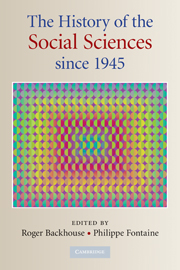4 - Political Science
Published online by Cambridge University Press: 05 June 2012
Summary
Introduction
Many histories can be told of political science. Some start in classical Athens (Almond 1995); others start in the Scottish Enlightenment (Farr 1988). But if we are specifically interested in political science as one of the set of institutionally differentiated disciplines that together make up contemporary academic social science, it was born in America early in the twentieth century (Ross 1991, chaps. 3 and 8; Adcock 2003). The prominence of America then and now might suggest a narrative of Americanization. However, we will argue that this narrative needs tempering with recognition of the influence of Europe on America and the way different traditions modify ideas adopted from elsewhere. The history of political science is one of the contingent transnational exchanges in which ideas are appropriated, modified, and transformed.
The direction and extent of the transnational exchanges vary across different aspects of political science. If the Americanization narrative appears most plausible with regard to the institutions of political science as an autonomous discipline, it becomes harder to sustain once our focus shifts to intellectual history. When we look at the British case, for example, we will argue that new empirical topics in political science arose from exchanges in which British figures played as great an initiating role as Americans; that new quantitative techniques were indeed more commonly developed in America and then adopted in Britain, but they were modified in the process of adoption; and that the postwar history of American political science has been dominated by new theories – from the positivist theories of behavioralism to rational choice theory – that had little impact on British political science.
- Type
- Chapter
- Information
- The History of the Social Sciences since 1945 , pp. 71 - 101Publisher: Cambridge University PressPrint publication year: 2010
References
- 2
- Cited by



